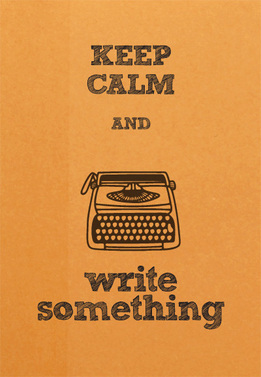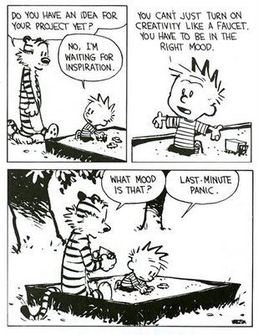
I remember being a college sophomore, trying to write an essay on Bram Stoker's Dracula for my 19th Century British Feminist Literature class; I had ABSOLUTELY NOTHING to say about it. To be honest, I kind of hated that book. I stared at the cursor blinking on the screen, willing four pages to magically appear in which I masterfully analyzed gender relations in the text.
Surprisingly, what helped was complaining to my roommate. She knew the book and explained why she didn't like it. This led to us discussing why neither of us liked Dracula. Our conversation provided me with enough fodder to formulate a thesis and a few points to support my argument. I started writing.
I'm not about to claim my essay on Dracula was the best thing I've ever written. In fact, it was not my finest moment. However, I fulfilled the assignment and moved on with my life.
Surprisingly, what helped was complaining to my roommate. She knew the book and explained why she didn't like it. This led to us discussing why neither of us liked Dracula. Our conversation provided me with enough fodder to formulate a thesis and a few points to support my argument. I started writing.
I'm not about to claim my essay on Dracula was the best thing I've ever written. In fact, it was not my finest moment. However, I fulfilled the assignment and moved on with my life.
Writing Through Writer's Block
Writer's Block is a totally real and completely fixable situation for students. First, determine the source of your Writer's Block. Second, jog your mind with some additional materials or discussion. Third, step away from the computer and engage in some Mindful Writing. Finally, come back to the essay and Write Anything.
1. Determining the Why
Did you read the book, watch the film, or do the research the assignment asks for? If not - there's your answer. How can you write about something you haven't looked over and thought about? If the essay is due tomorrow get strategic and pick certain sections to go back and read closely. Do NOT rely solely on online summaries - most professors are familiar with these resources and can easily spot a paper borrowing liberally from the CliffsNotes.
Do you understand the essay prompt? If you have time, email your professor or TA to ask them to clarify the assignment for you. If you need to discuss it with an instructor, request a meeting during office hours. Come prepared with your notes and ideas to see if you're on the right track.
What if you read the material and you understand the question, but you still are experiencing difficulty getting words on the page? It's time to look at what might be distracting you from the task. Did you have a fight with your significant other? Are you busy planning your roommate's birthday party? Tired from juggling a part-time job with being a full-time student? Worried about completing an assignment for another class?
If you determine that some external concern is causing your Writer's Block, find a way to resolve it to the point that you can move on to your paper. Maybe you need to write out some of your worries, schedule a meeting with your boss, or shoot an email to your friend asking her to help with the party-planning. Find a way to make some forward progress on the issue that is distracting you, so that you can get back to work.
Do you understand the essay prompt? If you have time, email your professor or TA to ask them to clarify the assignment for you. If you need to discuss it with an instructor, request a meeting during office hours. Come prepared with your notes and ideas to see if you're on the right track.
What if you read the material and you understand the question, but you still are experiencing difficulty getting words on the page? It's time to look at what might be distracting you from the task. Did you have a fight with your significant other? Are you busy planning your roommate's birthday party? Tired from juggling a part-time job with being a full-time student? Worried about completing an assignment for another class?
If you determine that some external concern is causing your Writer's Block, find a way to resolve it to the point that you can move on to your paper. Maybe you need to write out some of your worries, schedule a meeting with your boss, or shoot an email to your friend asking her to help with the party-planning. Find a way to make some forward progress on the issue that is distracting you, so that you can get back to work.
2. Jog Your Mind

So, you've read the book or watched the film. And yet...still...nothing is coming to you. Don't underestimate the power of reading a little bit more. Find journal or newspaper articles and read what other people have written about it.
You're smart enough to know I'm not suggesting you plagiarize their ideas. Rather, consider it a way to have a dialogue with someone else. If someone writes a scathing review of the book, mull over the criticisms. Do you agree?
Even better is having someone else to talk about the assignment with. If you can get together with a classmate to brainstorm, it benefits both of you. Personally, however, I've always preferred to speak with someone who isn't in the class. That way, the person functions as more of a sounding board for my ideas, by asking me questions and offering objective feedback.
You're smart enough to know I'm not suggesting you plagiarize their ideas. Rather, consider it a way to have a dialogue with someone else. If someone writes a scathing review of the book, mull over the criticisms. Do you agree?
Even better is having someone else to talk about the assignment with. If you can get together with a classmate to brainstorm, it benefits both of you. Personally, however, I've always preferred to speak with someone who isn't in the class. That way, the person functions as more of a sounding board for my ideas, by asking me questions and offering objective feedback.
3. Step Away From The Computer
Writer's Block is often symptomatic of stress. You might just need a break. The mind can only concentrate for so long. After you read some additional materials or discuss the paper with someone, jot down your ideas, and then move away from your desk.
Give yourself 30 minutes to an hour to grab some dinner, go for walk, hang out with a friend, or take a power nap. Do whatever recharges you - so that you return mentally refreshed and physically energized.
Give yourself 30 minutes to an hour to grab some dinner, go for walk, hang out with a friend, or take a power nap. Do whatever recharges you - so that you return mentally refreshed and physically energized.
4. Write Anything
I know - if it were that easy, why are we talking about Writer's Block? But hear me out; the hardest part is getting started. Writing out anything. A rough draft that you know is awful even as you type it still gives you something to work with.
An art professor of mine once explained how artists can overcome the fear of "messing up" when drawing. He told us to take our pencils, hold them up to the pristine canvas, and pick a spot to mark.
"There," he explained, "You've just started. Now, keep going."
This is applicable to writing as well. I don't care if you want to write out an introduction that says, "Introduction - My thesis will be something about how the end of World War I set up World War II...Treaty of Versailles: War Guilt Clause, Reparations, Disarming Germany." Then you realize, ok, you have plenty to say about the War Guilt Clause, and you write that part. In doing so, you set up your other two points. Then, you can go back and fix the introduction, so that it explains what you just wrote about.
In other words, it's fine to write something messy...you'll polish it later.
An art professor of mine once explained how artists can overcome the fear of "messing up" when drawing. He told us to take our pencils, hold them up to the pristine canvas, and pick a spot to mark.
"There," he explained, "You've just started. Now, keep going."
This is applicable to writing as well. I don't care if you want to write out an introduction that says, "Introduction - My thesis will be something about how the end of World War I set up World War II...Treaty of Versailles: War Guilt Clause, Reparations, Disarming Germany." Then you realize, ok, you have plenty to say about the War Guilt Clause, and you write that part. In doing so, you set up your other two points. Then, you can go back and fix the introduction, so that it explains what you just wrote about.
In other words, it's fine to write something messy...you'll polish it later.
Plan For Next Time
Learn from a bout with Writer's Block about which strategies worked for you. Anticipate what kinds of projects will potentially stump you at first, and start them early. Be proactive and speak with the professor, TA, or classmates about the assignment well in advance so that you can form plenty of ideas before sitting down to write.
Most importantly - don't panic. Writer's Block is real, but it is not permanent. Read up, talk it out, take a break, and then just write.
Most importantly - don't panic. Writer's Block is real, but it is not permanent. Read up, talk it out, take a break, and then just write.


